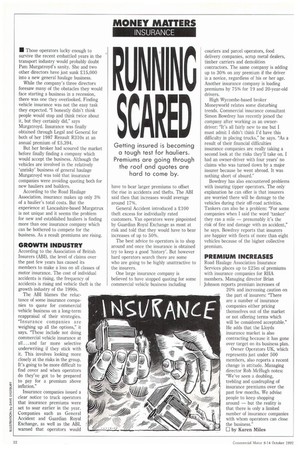RUNNING CARE
Page 24

If you've noticed an error in this article please click here to report it so we can fix it.
• Those operators lucky enough to survive the recent embattled years in the transport industry would probably doubt Pam Murgatroyd's sanity. She and two other directors have just sunk E15,000 into a new general haulage business.
While the company's three directors foresaw many of the obstacles they would face starting a business in a recession, there was one they overlooked. Finding vehicle insurance was not the easy task they expected. "I honestly didn't think people would stop and think twice about it, but they certainly did," says Murgatroyd. Insurance was finally obtained through Legal and General for both of her 1987 Renault R3 10s at an annual premium of E5,394.
But her broker had scoured the market before finally finding a company which would accept the business. Although the vehicles are involved in the relatively `unrisky' business of general haulage Murgatroyd was told that insurance companies were avoiding quoting both for new hauliers and builders.
According to the Road Haulage Association, insurance makes up only 3% of a haulier's total costs. But the experience at Lancashire-based Murgatrux is not unique and it seems the problem for new and established hauliers is finding more than one insurance company which can be bothered to compete for the business. As a result premiums are rising.
GROWTH INDUSTRY
According to the Association of British Insurers (ABI), the level of claims over the past few years has caused its members to make a loss on all classes of motor insurance. The cost of individual accidents is rising, the frequency of accidents is rising and vehicle theft is the growth industry of the 1990s.
The ABI blames the reluctance of some insurance companies to quote for commercial vehicle business on a long-term reappraisal of their strategies. "Insurance companies are weighing up all the options," it says. "These include not doing commercial vehicle insurance at all. .. and far more selective underwriting if they stick with it. This involves looking more closely at the risks in the group. It's going to be more difficult to find cover and when operators do they've got to be prepared to pay for a premium above inflation."
Insurance companies issued a clear notice to truck operators that insurance premiums were set to soar earlier in the year. Companies such as General Accident and Guardian Royal Exchange, as well as the ABI, warned that operators would have to bear larger premiums to offset the rise in accidents and thefts. The ABI said then that increases would average around 17%.
General Accident introduced a £100 theft excess for individually rated customers. Van operators were pinpointed by Guardian Royal Exchange as most at risk and told that they would have to bear increases of up to 50%.
The best advice to operators is to shop around and once the insurance is obtained try to keep a good 'history'. But however hard operators search there are some who are going to be highly unattractive to the insurers.
One large insurance company is believed to have stopped quoting for some commercial vehicle business including couriers and parcel operators, food delivery companies, scrap metal dealers, timber carriers and demolition contractors. The same company is adding up to 30% on any premium if the driver is a novice, regardless of his or her age. Another insurance company is loading premiums by 75% for 19 and 20-year-old drivers.
High Wycombe-based broker Moneyworld relates some disturbing trends. Commercial insurance consultant Simon Bowdrey has recently joined the company after working as an ownerdriver: "It's all fairly new to me but I must admit I didn't think I'd have this difficulty in placing trucks," he says. "As a result of their financial difficulties insurance companies are really taking a second look at the risks they'll take on. 1 had an owner-driver with four years' no claims who was turned down by a major insurer because he went abroad. It was nothing short of absurd."
Bowdrey has also encountered problems with insuring tipper operators. The only explanation he can offer is that insurers are worried there will be damage to the vehicles during their off-road activities. Tankers can also be a problem: "For some companies when I said the word 'tanker' they ran a mile — presumably it's the risk of fire and damage with an accident," he says. Bowdrey reports that insurers are happier with fleets of more than eight vehicles because of the higher collective premium.
PREMIUM INCREASES
Road Haulage Association Insurance Services places up to £25m of premiums with insurance companies for RHA members. Managing director Brian Johnson reports premium increases of 20% and increasing caution on the part of insurers: "There are a number of insurance companies either pricing themselves out of the market or not offering terms which will be considered acceptable." lie adds that the Lloyds insurance market is also contracting because it has gone over target on its business plan.
Owner Operators UK, which represents just under 500 members, also reports a recent change in attitude. Managing director Rob McHugh notes: "We've seen a doubling, trebling and quadrupling of insurance premiums over the past few months. We advise people to keep shopping around — but the reality is that there is only a limited number of insurance companies with whom operators can close the business," by Karen Miles




































































































